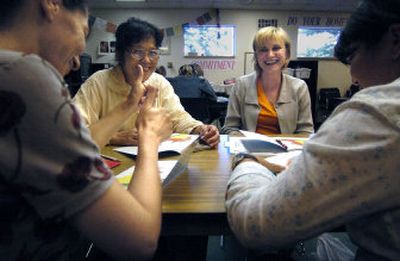Adult students read between the lines

A new program at Spokane’s Institute for Extended Learning is helping people read by teaching them to worry less about the words.
“People are told, ‘You’ve gotta figure out the words,’ ” said Doug Fadness, who works for the company that sells the Read Right program. “No, no, you don’t. You’ve got to figure out the message.”
The Community Colleges of Spokane, which oversees the institute, is the first two-year college in the country to adopt the program, which is now being used in more than 180 school districts and companies across the country.
Read Right focuses on teaching students to predict meanings in text, rather than learn language word by word, and it’s open to all adult students at the IEL. About 65 have signed up in the program’s first three weeks.
“It’s entirely different from the way reading is normally taught,” said Lora Shinskie, a reading instructor trained in the program for IEL. “We try not to use the word ‘word’ with our students.”
The program is based on the idea that becoming a good reader arises from the ability to predict meaning as you read a text – not upon reading and processing individual words, adding up the message as you go. To illustrate this point, Shinskie refers to a recent language experiment in which readers were shown a written message in which the letters in each word were out of order: “Aoccdrnig to rscheearch at an Elingsh uinervtisy …”
What researchers found is that people read the “words” with ease. Shinskie said that as readers encounter words, they predict and then confirm their meanings. So, when you read and understand the mixed-up words above, “you have not sounded out a word. You have predicted and confirmed a word.”
Another example of such a context-oriented reading approach is when readers come across a word they don’t understand, in the middle of a sentence full of words they do. A reader brought up on more traditional reading methods – steeped in what Fadness calls “errors in the guidance network” – might get stuck on the word.
In Read Right, they’re encouraged to skip the word, finish the sentence and then re-read it. Often, the context will help make the word’s meaning clear.
Reading instruction has been a subject of controversy for years, with debates over the effectiveness of systems based on phonics – understanding the sounds at the roots of language – and an approach called “whole language,” in which learning is based less on individual words and word parts than on stories, texts and interactions with others.
Many experts now say that such divisions oversimplify the process of learning to read, and that the most effective approaches combine different methods.
Read Right doesn’t fit neatly into either category, though it’s probably closer in spirit to whole language than to phonics, given its focus on context over individual word meanings.
Students work with tutors in groups of four or individually, and the tutors help coach them through readings attuned to their literacy level. There’s an emphasis on the message of a sentence rather than a literal, word-for-word translation, Fadness said.
Instructors at the Adult Education Center say Read Right works much faster than other literacy programs. The Read Right company says in one case, teenagers who used the program in a youth camp gained an average of more than three years in reading ability after 40 hours of instruction.
Gregory Holliday, a 46-year-old man who recently moved to Spokane from San Francisco, never truly learned to read. Before his class on Monday, he talked about his entrance into the class, describing his reading skills as “way down. I’m below the pregnant ant.”
Growing up in Chicago, he said, he attended school just to get off the streets and get something to eat, and teachers passed him along without caring whether he learned anything.
He’s taken five days of classes, and says he’s now curious about reading and trying to achieve his goal.
“If I can read a little bit, maybe I can go to the library and pick up a book and then learn more,” he said, smiling at the prospect. “The library is like a whole other world to me.”